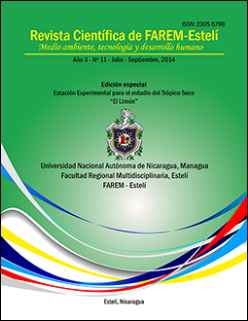Survival and biomass production, of Acacia pennatula (schlecht.) Benth for effect of three pruning heights EE. 2012
DOI:
https://doi.org/10.5377/farem.v0i11.1600Keywords:
Acacia pennatula, pruning height, survival, regrowth.Abstract
In this study, the biomass yielding was evaluated, regrowth capacity, and survival of Acacia pennatula established as natural regeneration 10 years ago. Making use of three pruning heights (2, 3 and 4 m), using three 10 m2 plots in which eight were taken per each plot. An initial cut was made in November 2012 and edible woody biomass was determined.
With the results obtained it can be inferred that biomass production increases slightly when pruning is performed at a 2 meter high (578 kg DM / ha), with no statistical differences compared to other cutting heights (P> 0.4993. The survival of Acacia pennatula remains at 100% when pruning is done at 4 meters high, but not when it is done at a 2 or 3 m high. The regrowth capacity of the species is encouraged when pruning is at four meters reaching an average of 101 regrows, contrary to when it is done within 2 or 3 meters, the amount of regrowth decreases by 50%.
The quality of the regrows (length and basal diameter) is stimulated and it is presented as significant (P <0.040), when pruning is done in reduced heights. But the increase in both diameter and length of the regrows are increased when the heights of pruning are given at four meters high. It is concluded that the pruning height allows the increase in survival and in number of regrows, with a shorter length and diameters thereof; but with significant increases. Measurements of the production of biomass of regrows obtained would have to be continued.
DOI: http://dx.doi.org/10.5377/farem.v0i11.1600
Revista Científica de FAREM-Estelí No.11 2014: 5-12
Downloads
1009
Downloads
Published
How to Cite
Issue
Section
License
© Revista Científica de FAREM-Estelí

